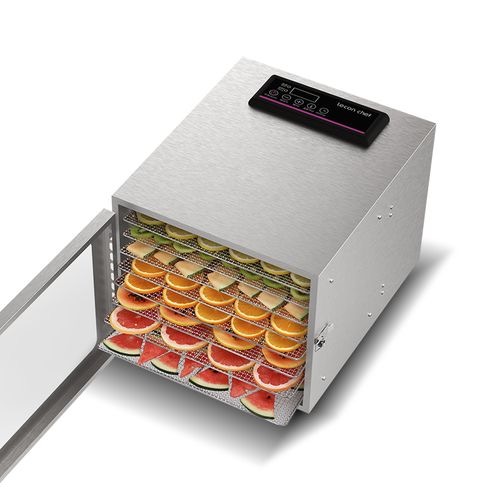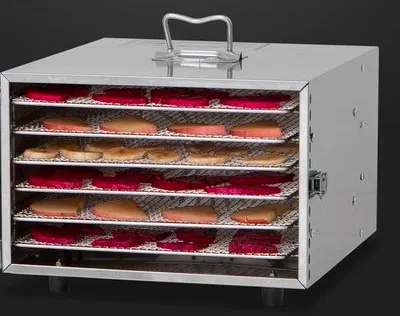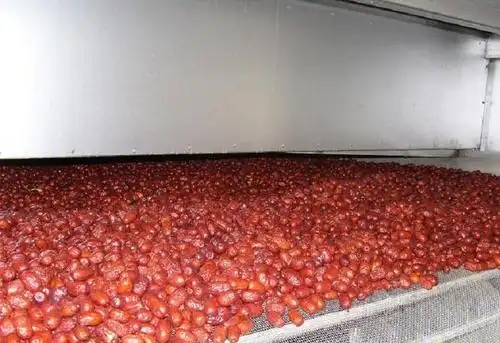
Content Menu
● Understanding Heat Pump Dryers
● Main Disadvantages of Heat Pump Dryers
● Comparative Analysis: Heat Pump Dryers vs. Traditional Dryers
● Benefits of Using Heat Pump Dryers
● Additional Considerations When Choosing a Heat Pump Dryer
● Real-Life Applications of Heat Pump Technology
● Conclusion
● Frequently Asked Questions (FAQ)
>> 1. How much longer do heat pump dryers take to dry clothes?
>> 2. Do you need to empty water from a heat pump dryer?
>> 3. What should I look for when buying a heat pump dryer?
>> 4. Where should I place my heat pump dryer?
>> 5. Are heat pump dryers worth the investment?
Heat pump dryers have gained popularity due to their energy efficiency and eco-friendliness. However, they come with several disadvantages that potential buyers should consider. This article will explore the main drawbacks of heat pump dryers, particularly in the context of food dehydrators, as well as provide insights into their operation, benefits, and maintenance needs.

Understanding Heat Pump Dryers
A heat pump dryer is an appliance that uses a refrigeration cycle to dry clothes without venting hot air outside. Instead of expelling moisture-laden air, it recycles warm air within the drum. This method not only saves energy but also minimizes environmental impact.
- How It Works: The dryer uses a compressor to circulate refrigerant between evaporator and condenser coils. The warm air absorbs moisture from wet clothes, which is then condensed back into water and collected in a reservoir or drained away.
- Energy Efficiency: Heat pump dryers are known for their energy-saving capabilities, using up to 28% less energy compared to traditional dryers. This efficiency makes them an attractive option for environmentally conscious consumers.
Main Disadvantages of Heat Pump Dryers
Despite their advantages, heat pump dryers have notable drawbacks:
- Longer Drying Times: One of the most significant disadvantages is the longer drying time. Because heat pump dryers operate at lower temperatures to protect fabrics, they can take 15 to 30 minutes longer than conventional dryers to complete a cycle. This extended duration can be inconvenient for users who require quick drying solutions.
- Higher Initial Cost: Heat pump dryers tend to be more expensive upfront compared to traditional vented models. This higher price can be a barrier for many consumers, despite potential savings on energy bills over time. The investment in a heat pump dryer may not be justifiable for those with limited budgets or infrequent laundry needs.
- Maintenance Requirements: Regular maintenance is crucial for optimal performance. Lint can accumulate in filters and coils, necessitating frequent cleaning to avoid reduced efficiency and potential breakdowns. Users must commit to this upkeep to ensure that their dryer operates effectively over its lifespan.
- Mold Risk: Since heat pump dryers generate moisture during operation, there is a risk of mold growth if water leaks or if the appliance is not properly maintained. This can lead to unpleasant odors and health concerns. Homeowners should be vigilant about checking for signs of mold and addressing any issues promptly.
- Smaller Capacity: Many heat pump dryer models have smaller drum capacities compared to conventional dryers. This limitation may pose challenges for larger households or those needing to dry bulky items such as comforters or towels. Users might find themselves running multiple cycles to complete their laundry tasks.
Comparative Analysis: Heat Pump Dryers vs. Traditional Dryers
| Feature | Heat Pump Dryer | Traditional Dryer |
| Energy Efficiency | High (up to 28% less energy) | Lower (higher operational costs) |
| Drying Time | Longer (15-30 minutes extra) | Shorter |
| Initial Cost | Higher | Lower |
| Maintenance | Requires regular cleaning | Less frequent maintenance |
| Capacity | Generally smaller | Larger |
| Mold Risk | Higher if not maintained | Lower (ventilation reduces risk) |
Benefits of Using Heat Pump Dryers
Despite their disadvantages, heat pump dryers offer several benefits:
- Gentler on Fabrics: The lower drying temperatures help preserve the integrity of clothes, reducing wear and tear. This feature is particularly beneficial for delicate fabrics that might otherwise be damaged by high heat.
- Flexible Installation: Without the need for external venting, heat pump dryers can be installed in various locations within the home. This flexibility allows homeowners to maximize space and place the dryer in more convenient areas.
- Eco-Friendly: Their energy-efficient operation contributes to a reduced carbon footprint, making them an environmentally friendly choice. Many consumers are increasingly prioritizing sustainability in their purchasing decisions.

Additional Considerations When Choosing a Heat Pump Dryer
When considering a heat pump dryer, it's essential to evaluate several additional factors:
- Noise Levels: Some models can be noisier than others due to their compressors and fans. If noise is a concern, look for models specifically designed for quiet operation.
- Sensor Drying Technology: Many modern heat pump dryers come equipped with sensor drying technology that automatically adjusts drying times based on moisture levels in the drum. This feature can enhance convenience and prevent over-drying.
- Warranty and Customer Support: Given the higher initial investment, it's wise to consider the warranty offered by manufacturers and the availability of customer support services should any issues arise.
- Design and Aesthetics: While functionality is paramount, many consumers also consider the design of appliances. A sleek, modern design can complement home decor while providing efficient performance.
Real-Life Applications of Heat Pump Technology
Heat pump technology is not limited to clothes drying; it has various applications across different industries:
- Food Dehydration: In food processing, heat pumps are used in dehydrators that preserve fruits, vegetables, and meats by removing moisture while maintaining flavor and nutritional content. These machines operate similarly by recycling warm air and controlling humidity levels.
- Heating Systems: Heat pumps are commonly used in heating systems for homes and commercial buildings, providing an efficient way to regulate temperature without excessive energy consumption.
- Swimming Pools: Pool heaters utilize heat pump technology to maintain comfortable water temperatures year-round while minimizing energy costs associated with traditional heating methods.
Conclusion
In summary, while heat pump dryers present numerous advantages such as energy efficiency and gentler drying processes, they also come with significant disadvantages including longer drying times, higher initial costs, maintenance requirements, mold risks, and smaller capacities. Consumers should weigh these factors carefully when considering whether a heat pump dryer is right for their needs.
Ultimately, understanding both the pros and cons allows potential buyers to make informed decisions that align with their lifestyle and laundry habits. For those who prioritize sustainability and fabric care over rapid drying times and lower upfront costs, investing in a heat pump dryer may prove beneficial in the long run.

Frequently Asked Questions (FAQ)
1. How much longer do heat pump dryers take to dry clothes?
Heat pump dryers typically take 15 to 30 minutes longer than traditional vented dryers due to their lower operating temperatures.
2. Do you need to empty water from a heat pump dryer?
Yes, most heat pump dryers require users to empty a water reservoir or have a drainage system in place for the moisture collected during drying cycles.
3. What should I look for when buying a heat pump dryer?
Consider factors such as energy efficiency ratings, drying capacity, noise levels, and additional features like sensor drying and lint filters when purchasing a heat pump dryer.
4. Where should I place my heat pump dryer?
It's best to place a heat pump dryer in a well-ventilated area with enough space around it for proper air circulation and maintenance access.
5. Are heat pump dryers worth the investment?
While they are more expensive initially, the long-term savings on energy bills and the benefits of gentler drying may make them a worthwhile investment for many consumers.












